|
|
|
Sort Order |
|
|
|
Items / Page
|
|
|
|
|
|
|
| Srl | Item |
| 1 |
ID:
140506
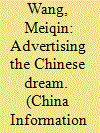

|
|
|
|
|
| Summary/Abstract |
Consumerism is a central feature of urbanism in China and has been actively promoted as a sign of urbanity in the official rhetoric and mass media. This urban ideology is exemplified by the ubiquitous presence of street advertisements that often occupy prominent urban public spaces. After all, turning every citizen of China into a consumer has become a widely accepted Chinese dream and one that is employed to mobilize a population otherwise divided by the ever-widening gap between the rich and poor. Advertisements have assumed a commanding role and are utilized by both official entities and private corporations to promote all kinds of urban consumption, ranging from concrete commodities such as high-end homes, beautiful neighbourhoods, and luxurious goods to intangible symbols such as lifestyle, ideology, and cosmopolitan identity. All these have fallen under the scrutiny of the Shanghainese artist Ni Weihua, whose photography documents billboards advertising official ideologies and real-estate projects in Shanghai and other cities. This study brings into context Ni’s artistic practice and examines specific ways in which his photographic series Keywords (关键词) and Landscape Wall (风景墙) engage with formal advertisements in the street both as an urban reality and as a site for deconstruction.
|
|
|
|
|
|
|
|
|
|
|
|
|
|
|
|
| 2 |
ID:
155923
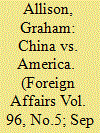

|
|
|
| 3 |
ID:
132413
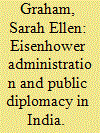

|
|
|
|
|
| Publication |
2014.
|
| Summary/Abstract |
The United States-India relationship was fraught with misapprehension and ideological disagreement during the 1950s. Public diplomacy provides a valuable context for examining these dynamics. This analysis assesses the planning, deployment, and reception of American public diplomacy to India under President Dwight Eisenhower, a period encompassing Washington's 1954 alliance with Pakistan and economic aid to India in 1957-1958. Public diplomacy reflects the Administration's difficulty in clarifying its interests in India. The rhetorical and moralising approach of India's leadership, and their prominence in the global non-aligned movement, contributed greatly to this ambivalence. Public diplomacy planning highlights Washington's difficulties in confronting India's identity in world politics; it struggled to craft messages on racial attitudes, consumerism, and Communism, whilst Soviet public diplomacy gave strong competition throughout the period. At the same time, several aspects of American public diplomacy resonated with Indian audiences, indicating that there was the possibility of a closer American relationship with India had Washington taken a different high policy approach to the region.
|
|
|
|
|
|
|
|
|
|
|
|
|
|
|
|
| 4 |
ID:
129930


|
|
|
|
|
| Publication |
2014.
|
| Summary/Abstract |
Niloufer Bhagwat posits that the message, example and methods of Mahatma Gandhi are being remembered in many countries today as he had indentified the ills of capitalism and pointed out solutions to problems, which have since grown much bigger. These include destructive industrialisation, ecological issues, runaway technological militarism in the service of unaccountable financial elites and unsustainable consumerism, among others.
|
|
|
|
|
|
|
|
|
|
|
|
|
|
|
|
| 5 |
ID:
157915


|
|
|
|
|
| Summary/Abstract |
Drawing on a framework that goes beyond the usual securitization lens and that includes other neglected sociological dynamics, namely consumerism and individualization, this article explores an overlooked form of dress in the research on Islamic dress in the West which is Islamic street wear. This analysis interrogates what Islamic street wear reveals, in terms of identity, about the experience of young Muslims living as a minority in secular spaces. Various messages collected from message T-shirts are deconstructed to precisely highlight the effect of these different dynamics on the articulation of identities by young Muslims. A theoretical framework grounded in the notion of hybridity guides a systematic content analysis of the messages. The analysis of these messages reveals the strong individualization of faith deriving from consumerist patterns, the rather limited expression of the controversial “ummatic” loyalty to Muslims worldwide and the assertion of pride in Muslim identity.
|
|
|
|
|
|
|
|
|
|
|
|
|
|
|
|
| 6 |
ID:
122868


|
|
|
| 7 |
ID:
146784


|
|
|
|
|
| Summary/Abstract |
This article enquires into the socioeconomic causes of recurrent food scarcity in the nineteenth-century Middle East. Focusing on Iran as a case study, the paper shows that certain categories involved in the production and distribution of grain engaged in profiteering schemes and thereby contributed to the making of food shortage in urban settings. The most important of these groups were the government officials, the landed classes, and the grain merchants. The local bakers were also involved, but they did not have as decisive a role as the other groups. In showing how these categories engaged in market manipulation, the paper contends that food scarcity cannot be explained without a proper understanding of the commercialization of grain and the economic integration of the Middle East in the nineteenth century.
|
|
|
|
|
|
|
|
|
|
|
|
|
|
|
|
| 8 |
ID:
142353


|
|
|
|
|
| Publication |
New Delhi, Kapur Surya Foundation, 2005.
|
| Description |
297p.hbk
|
|
|
|
|
|
|
|
|
|
|
|
Copies: C:1/I:0,R:0,Q:0
Circulation
| Accession# | Call# | Current Location | Status | Policy | Location |
| 058408 | 323.4/KAP 058408 | Main | On Shelf | General | |
|
|
|
|
| 9 |
ID:
193606
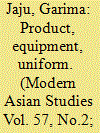

|
|
|
|
|
| Summary/Abstract |
The article focuses on how low and lower-middle class youth employed in new private sector jobs in the booming service economy in Indian cities engage with the material environment of their workplace, and how, through their ‘aesthetic scrutiny’ of its materiality, come to ‘consume’ work. The setting is the store floor of a fast-expanding organized retail company, called Spexy, that sells budget eyewear products. Through ethnographic elaboration, the article follows how the Spexy staff deride the ‘un-branded’ products, ‘un-technical’ equipment, and ‘un-professional’ uniforms at their workplace. The company, as constituted of these ‘poor’ materials, is mocked for failing in its ‘company-ness’ and branded ‘fake’. The material environment of the workplace provides a platform for the articulation of larger configurations of ‘feelings’ the youth seek to give and get through formal employment in a private company. These articulations, in turn, reveal larger sociocultural valuations regarding ideas of social mobility and visibility in contemporary India where there is a strong interest in brand regimes and brand value hierarchies, fixation with technological education and expertise, and attraction towards a corporate work culture in the private sector, and, concomitantly, a strong desire amongst the store staff to craft branded, technical, and professional work identities. By putting the scholarship on work and consumption in dialogue, the article demonstrates how bottom-rung urban workers look expectantly to the material environment of company work to fulfil these desires.
|
|
|
|
|
|
|
|
|
|
|
|
|
|
|
|
| 10 |
ID:
129011
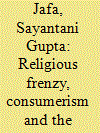

|
|
|
| 11 |
ID:
109467


|
|
|
|
|
| Publication |
2011.
|
| Summary/Abstract |
Medical tourism' has frequently been held to unsettle naturalised relationships between the state and its citizenry. Yet in casting 'medical tourism' as either an outside 'innovation' or 'invasion', scholars have often ignored the role that the neoliberal retrenchment of social welfare structures has played in shaping the domestic health-care systems of the 'developing' countries recognised as international medical travel destinations. While there is little doubt that 'medical tourism' impacts destinations' health-care systems, it remains essential to contextualise them. This paper offers a reading of the emergence of 'medical tourism' from within the context of ongoing health-care privatisation reform in one of today's most prominent destinations: Malaysia. It argues that 'medical tourism' to Malaysia has been mobilised politically both to advance domestic health-care reform and to cast off the country's 'underdeveloped' image not only among foreign patient-consumers but also among its own nationals, who are themselves increasingly envisioned by the Malaysian state as prospective health-care consumers.
|
|
|
|
|
|
|
|
|
|
|
|
|
|
|
|
| 12 |
ID:
130731


|
|
|
|
|
| Publication |
2014.
|
| Summary/Abstract |
The gendered character of India's fertility decline has attracted considerable academic attention. In this paper, I offer a critique of the arguments of some demographers about the linkages between dowry, daughter aversion and the marriage squeeze that predict that increasing shortages of marriageable women will result in declines in dowry. I argue that such economistic readings seriously oversimplify the complexities of marriage arrangement 'on the ground' in contemporary India. Further, whilst one aspect of dowry might relate to the supply and demand of brides and grooms, dowry and daughter aversion are not simply outcomes of demographics alone. First, marriage migration is crucial in understanding daughter aversion. Second, dowry is not just a matter of marriage and kinship practices. Dowry is a polyvalent institution that also connects with conspicuous display in status competition in a hierarchical society and with people's rising aspirations to possess consumer goods within the wider context of contemporary India's rapidly changing political economy. Crucially, marriage migration, status competition and consumerism do not necessarily push in the same direction as the demographics of the marriage squeeze might imply when it comes to dowry and daughter aversion.
|
|
|
|
|
|
|
|
|
|
|
|
|
|
|
|
| 13 |
ID:
089200


|
|
|
|
|
| Publication |
2009.
|
| Summary/Abstract |
This article identifies several theoretical approaches to the role of culture in the construction of national identity. Embedded in the presently emerging approach, which emphasises the relations between popular culture/consumerism and national identity, this study focuses on a specific consumer good manufactured in Israel in the early 2000s, the height of the second Palestinian Intifada (uprising): small sugar packets bearing portraits of the patriarchs of Zionism. The analysis of this product, employing semiotic analysis, interviews and focus groups, locates it in the five 'moments' of du Gay's 'circuit of culture' (i.e. identity, representation, production, consumption and regulation). Three main general arguments were stated, empirically examined and largely sustained: (1) Consumer goods are used not only for constructing national identity but also as a means for 'healing' it; (2) in their 'healing' capacity, representations of nationalism on consumer goods do not add new elements to representations offered by the 'high' official version of nationalism but replicate them in a simplified way; (3) while trivialising the insights and concepts that originated in 'high' culture, consumer goods expose the prejudices, stereotypes and rules of inclusion and exclusion that in 'high' culture are often hidden in a sophisticated manner.
|
|
|
|
|
|
|
|
|
|
|
|
|
|
|
|
| 14 |
ID:
138273


|
|
|
|
|
| Summary/Abstract |
The ombudsman institution, in both the public and private sectors, is increasingly identified with the ethos of consumerism and the protection of consumer rights. The current trend is exemplified and reinforced by the EU ADR Directive and by the government response to a recent inquiry into complaints conducted by the Public Administration Select Committee. This article argues that the dominant consumerist ethos diminishes the ability of the ombudsman institution to fulfil its potential. If the ombudsman institution, in particular as manifest in the office of the UK Parliamentary Ombudsman, is to serve the public interest, it must instead promote human rights principles and constitutional morality, adopt a process that is marked by public reasoning and participation and seek by a whole-system approach to realise a vision that is integrated and truly democratic.
|
|
|
|
|
|
|
|
|
|
|
|
|
|
|
|
| 15 |
ID:
096662


|
|
|
|
|
| Publication |
2010.
|
| Summary/Abstract |
This article categorises the emerging conceptualisations of Fair Trade and explores which of them offers the best characterisation of the project. It introduces Fair Trade and establishes a set of desiderata to guide the process of conceptualisation. It is argued that the practices and rhetoric of the project suggest it is best characterised as an attempt to establish a form of interim global market justice in a non-ideal world. Three alternative conceptualisations are explored, some including sub-categories. In each section a description of the view is outlined and it is argued that each such alternative is either an unpersuasive account of Fair Trade or cannot better the one already defended. In the final section the normative debate surrounding Fair Trade conceptualised as an attempt to establish interim global market justice in a non-ideal world is introduced. The article suggests that there are avenues for the project's ethical defence but concludes that this can be settled only with further research.
|
|
|
|
|
|
|
|
|
|
|
|
|
|
|
|
| 16 |
ID:
144348


|
|
|
|
|
| Summary/Abstract |
The shopping mall entered Central Asia's commercial sector as a result of the economic transformation of post-Soviet space. Constructed near the centre of the city, the shopping mall overwrites the urban landscape, dominating it as a symbol of modernity. It functions as a gateway of global consumerist culture to the Eurasian steppe. Using the MEGA shopping mall in Aktobe, in western Kazakhstan, as an example, this article shows that the building acts as a stage for the construction of a new social and cultural space. This study focuses on the ways in which young women interact with the mall's spaces. The mall turns out to be a playground not only for children, but also for the whole younger generation, who come to this unique place to see and be seen. The mall became a hot spot of youth culture in the post-socialist worker's city by offering more than a mere shelter from dust and snow storms on the steppe. The available amenities made it a favourite place for meeting, consuming and dreaming. Young women especially are attracted to MEGA to experience the newest fashions and build social relationships.
|
|
|
|
|
|
|
|
|
|
|
|
|
|
|
|
|
|
|
|
|